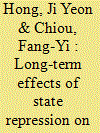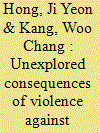| Srl | Item |
| 1 |
ID:
182590


|
|
|
|
|
| Summary/Abstract |
This article examines how violence against citizens affects their political attitudes and behavior in the long run, and how those effects vary over time. We construct and analyze a novel dataset on the victims of Taiwan's February 28 Incident, in 1947, with survey data spanning 1990 to 2017. Our empirical analysis shows that cohorts having directly or indirectly experienced the Incident are less likely to support the Kuomintang Party (KMT), the former authoritarian ruling party responsible for the Incident. They tend to disagree with the key conventional policy stand of the KMT (unification with mainland China), are more likely to self-identify as Taiwanese, and are less likely to vote for KMT presidential candidates. Taiwan's residents who were born in towns with larger number of casualties during the Incident are more likely to reject unification. Finally, the effects are found to vary over the period following democratization.
|
|
|
|
|
|
|
|
|
|
|
|
|
|
|
|
| 2 |
ID:
156421


|
|
|
|
|
| Summary/Abstract |
In this paper, we examine the extent to which wartime violence against civilians during the Korean War affects people's current attitudes toward South Korea and other involved countries. Using a difference-in-differences (DID) approach that compares the cohorts born before and after the war, we find that direct exposure to wartime violence induces negative perceptions regarding perpetrator countries. As many of the civilian massacres were committed by the South Korean armed forces, prewar cohorts living in violence-ridden areas during the war demonstrate significantly less pride in South Korea today. In contrast, postwar cohorts from those violent areas, who were exposed to intensive anti-communist campaigns and were incentivized to differentiate themselves from the victims, show significantly greater pride in South Korea, and greater hospitality toward the United States than toward North Korea, compared to prewar cohorts in the same areas and to the same cohorts born in non-violent areas.
|
|
|
|
|
|
|
|
|
|
|
|
|
|
|
|